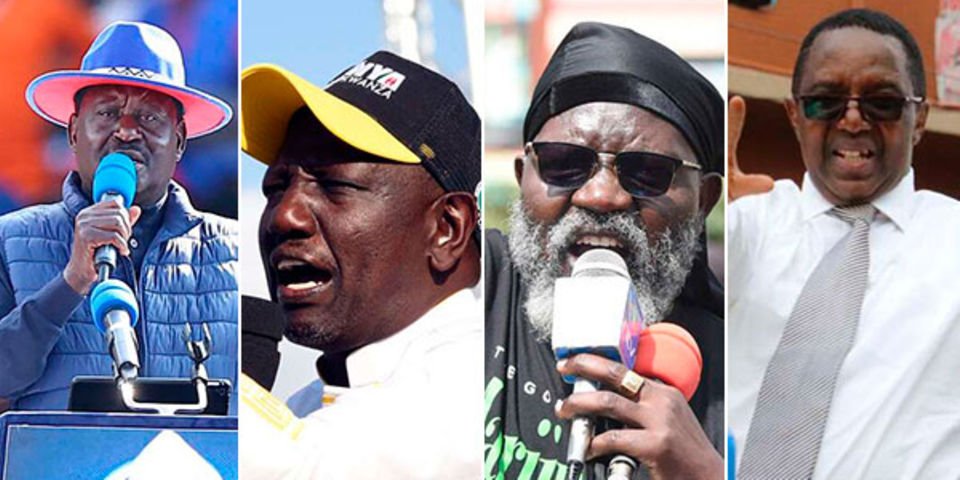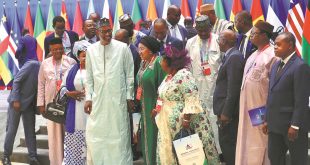By Walter Menya & Onyango K’Onyango
Published:August 08,2022

In 48 hours, Kenyans will be casting their votes in an election that has been dominated by the economy but carries more than just that. It could herald a turning point for the country in many ways.
So much has happened since the 2017 General Election that was marred by tension and a nullification of the presidential ballot outcome by the Supreme Court. Each of the political formations that have emerged post-2017 claims to be the agent of change.
“Ours is a coalition of change,” Deputy President William Ruto, who is flying the United Democratic Alliance (UDA) flag, said Saturday at a press conference in Karen.
His opponents, Raila Odinga, Prof George Wajackoyah and David Waihiga, too, have said they represent change. In his campaigns, Prof Wajackoyah has talked of his “theory of economic turnaround… centred on growth and industrial production of marijuana.”
Read: Wajackoyah, Waihiga call for ‘real’ change
President Uhuru Kenyatta’s succession has been characterised by a lot of political intrigues, culminating in this unique political contest—the bromance between the President and Dr Ruto having disappeared and in its place, an acrimonious falling-out, and Mr Odinga and President Kenyatta, who viciously fought in the last two general elections, being in the same camp against Mr Ruto. The coming together of the former rivals saw the formation of a coalition political party—Azimio la Umoja One Kenya.
Unlike his predecessor Mwai Kibaki, who took a low profile in his succession, President Kenyatta, who is the chairman of the Azimio Council, has come out openly to campaign for his preferred successor.
Former President Daniel Moi, who had ruled for 24 years, endorsed and unsuccessfully campaigned for Mr Kenyatta in the 2002 presidential election that was won by Mr Kibaki.
Meanwhile, Covid-19, which struck in 2020, has hit the economy hard and the cost of living has increased exponentially as prices of basic goods skyrocket.
Generationally, and even as revealed in the polls conducted during the campaign period, the two main rivals for the presidency are appealing to different age groups: Mr Ruto, the polls indicated, is more liked by the youth aged between 18 and 34, while the 35-year-olds and above are biased in favour of Mr Odinga.
A win for Mr Ruto, therefore, could mean a significant change in the political landscape as the big families that have dominated the country politically could be staring at being swept away by the ‘hustler’ wave associated with Mr Ruto.
There is also the gender aspect to this election following the nomination of former Cabinet minister Martha Karua as Mr Odinga’s running mate. A win for Mr Odinga would see Ms Karua become the first ever woman in the country to rise to such a position, which, since Independence, has remained the preserve of men. Following her nomination, several gubernatorial candidates have also nominated women as their running mates, meaning there could be more women deputy governors this time since the advent of devolution.
With so much having happened from 2017, no matter the outcome, this election could be a turning point for the country
Economically, the country has been reeling from internal and external shocks that have hit the people’s pockets as prices of basic commodities rise. Institute of Economic Affairs chief executive Kwame Owino says the person who will succeed Mr Kenyatta will have to focus on containing wastage in government to get money for the campaign promises
“Are there places where wastage can be cut? Certainly there are, in the public sector and the Office of the Auditor General does it quite a lot. In my view, whoever is prepared to go look at audited accounts, detect where money is being lost and wasted and choose to close those loopholes, might make some space to spend, but huge spending on new programmes is not possible,” he said.
As a result, the campaign has been dominated by competing economic approaches to how to reduce the cost of living and stabilise the economy.
Pro-poor policies
Both DP Ruto and Mr Odinga, having set their eyes on State House, this week have outlined a raft of pro-poor policies to bolster their chances of ascending to power. Mr Ruto, having associated himself with ‘Hustler Nation’s bottom-up economic model, while the former Prime Minister has unveiled a rural economy plan.
With the country facing several woes due to skyrocketing prices of basic commodities like fuel, the presidential candidates have intensified their pitches with populist promises to arrest the high cost of living.
Within his first 100 days in office, Dr Ruto has pledged to establish a Sh50 billion Hustlers’ Fund, allocate 50 per cent of his Cabinet to women, implement the problematic two-thirds gender rule for appointive and elected officials, and halt allegedly selective investigation and prosecution of corruption cases. The UDA candidate has also proposed immediate tax reductions on basic commodities and fuel to reduce the heavy burden Kenyans are currently carrying.
With his Hustlers’ Fund, Kenya Kwanza Alliance is eyeing the youth vote, which is 8.8 million against 13.3 million for the elderly population.
Sh6,000 monthly stipend
On the other hand, in his first 100 days, Mr Odinga will approve funds for his Sh6,000 monthly stipend programme for the poorest families, absorb all jobless teachers into the government payroll, reintroduce Guaranteed Minimum Returns for farmers and roll out universal health insurance cover dubbed ‘BabaCare’.
Then there is the age factor, both for the candidates and their supporters. On the supporters, Jubilee director of elections Kanini Kega, who is also the Kieni MP, is excited about the fact that the poll could be decided by the older generation.
Read: What Raila, Ruto plan to roll out in first 100 days
“There has been a fallacy that the majority of the voters are below 35, but this one is very clear that they are above 35. As Azimio, we have been focussing on all the age groups from young to old and that is the reason we have programmes for all. For the Kenya Kwanza team, their focus has been on these young voters and it has become apparent that the young voters would not be the determinants,” says Mr Kega.
“Secondly, the shrinking number of young voters coupled with the entrance of George Wajackoyah, who is also targeting the young voters, means that the votes that Ruto and his team were relying on are at huge risk. For us, we are okay and we are good with the numbers.”
Follow ‘tribal chieftains’
According to Prof Egara Kabaji of Masinde Muliro University, youth might have been lured by how the DP has conducted his campaigns but when it comes to voting, the majority will follow their “tribal chieftains”.
“If Ruto manages to dismantle the belief that we all have to vote along tribal lines and vote class instead of the tribe, then he is on the right path. If he does not manage it, then he is in for a rude shock,” said Prof Kabaji.
The age of the candidates has also featured prominently, with DP Ruto’s camp portraying themselves as the young team with the energy to face the rigours of running a government. It mirrors the 2013 ‘digital versus analogue’ campaign of Jubilee against Cord.
“If you observe keenly, is Raila having enough energy to lead this country? Can he manage to govern this country, which has a lot of debts and problems? This country where millions of youth are jobless. Will that old man succeed?” DP Ruto, who is 55, posed to a cheerful crowd at Wabukhonyi in Tongaren, Bungoma County,
recently.
Mr Odinga is 77, Prof Wajackoyah is 63 and Mr Waihiga is also in his 60s.
President Kenyatta, who ran on the ‘digital versus analogue’ platform has now advised that age should not be a deciding factor in choosing leaders but rather character. “Old age is not a disease. What is important is a person who has the people at heart, a person with humility, a man who is not interested in chasing money and other people’s wives,” the Head of State said this week while in Bungoma County.
Mr Odinga’s running mate, Narc Kenya leader Martha Karua, recently referred to former President Kibaki’s performance, while he was aged, saying it transformed the country positively. “If you are told Raila is old, yes he is old. He is politically mature and well organised. There comes a time when a country needs a mature and sober leader who has a cool temperament,” she said.
With President Kenyatta drumming up support for Mr Odinga, the outcome of Tuesday’s election also has the potential to end two things that have taken place in this country for years.
Kikuyu-Kalenjin stranglehold
If the Azimio boss trounces DP Ruto, it will have broken the Kikuyu-Kalenjin stranglehold on the presidency since Independence. At the same time, Mr Kenyatta will be the first retiring President to successfully determine his successor.
Laikipia governor Ndiritu Muriithi says the working together of President Kenyatta and Mr Odinga has healed the wounds due to the disagreements between their fathers. Kenyatta’s father Jomo was the country’s first president while Odinga’s father Jaramogi served as vice-president.
“President Uhuru Kenyatta is the ultimate political realist who has been able to turn circumstances that appear very difficult and work with them. Before 2013, there was serious work and he managed it through his alliance with Dr Ruto. The rapprochement between him and the former Prime Minister took many people by surprise, hence the opposition by some,” he said.
The governor is Mr Odinga’s presidential campaign board chair. He says President Kenyatta will be remembered for making political moves, which his predecessors could not achieve, for the sake of uniting Kenya.
“His succession is going to heal rifts that have existed between our people for a long time. If you take political competition between Kikuyu and Luo, it is a thing of the past now. Every time these two major groups are on the same side, Kenya moves forward,” said Mr Muriithi.
Source:nation.africa
 Africa -China Review Africa -China Cooperation and Transformation
Africa -China Review Africa -China Cooperation and Transformation
